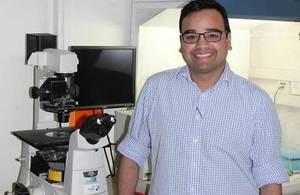‘Nano’ collaboration makes a big impact
A University of Southampton researcher reflects on his time at Tel Aviv University as part of a Science and Innovation Researcher Mobility fellowship.

“Alone we can do so little; together we can do so much.” - Helen Keller
Partnerships allow us to deliver better quality science; science that has a lasting impact in the field; science which has the substance to make a difference. One only has to look at the latest articles in Nature to see that the most impactful science has authorship spanning several continents.
The way we approach scientific problems differs from place to place and amalgamating these perspectives often leads to a solution. I recently benefited from the power of collaboration as a fellow of the UK-Israel Nanoscience Fellowship, created by the UK’s Science and Innovation Network in Israel.
In 2014, I returned to the laboratory after a lengthy period of surgical training. In the Mirnezami-Sayan lab at the University of Southampton we are interested in how supporting (stromal) cells interact with cancer cells. It was a stark contrast moving from bedside to benchside; so I began reading in earnest. This is where I first came across Dr. Noam Shomron, Tel Aviv University, giving a lecture on microRNAs — small molecules which allow one cell to determine the fate of another — I immediately got in touch.
It was Dr. Shomron, in his characteristically positive and encouraging manner, who first drew my attention to the UK-Israel Nanoscience Fellowship. The fellowship allows doctoral and post-doctoral researchers in the UK to work in a laboratory or institution in Israel (or vice versa), for up to six months; developing a project in the broad discipline of ‘nanoscience’. The Science and Innovation Network is quite flexible about when you can take up the fellowship, as this will depend on the project and the personnel involved.
So here I am, half way into a month long exchange at the Sackler Faculty of Medicine at Tel Aviv University. During this time, I have had the opportunity to dive into the different research happening here. I have worked on diverse microRNA profiling studies and not just in my field of colorectal cancer. I have learned new techniques to optimally extract RNA from serum and plasma. We are also writing an important perspective on how to approach genomic screening in the personalised medicine era.
What has the fellowship given me? Of course, I will have novel data which will contribute to my PhD thesis and will, I hope, be published, but I have also experienced scientific culture away from home. Most importantly, I have built up this wonderful collaboration between our institutions, which I hope others can benefit from.
A few recommendations from my experience:
- Have a clearly defined project which is achievable in the specified time period.
- Meet with your academic supervisor at home and your host supervisor to verify that they agree to such a collaboration.
- Give yourself at least two weeks to write the application and at least one week to collect and append the required references and approvals.
- If possible, embark on a pre-fellowship visit to meet your host in person and organise logistical arrangements.
Note that British citizens do not require a visa to visit scientific institutions in Israel.
Finally, I must acknowledge those who have allowed me to realise the full potential of this fellowship: Dr. Noam Shomron for being a warm and generous host, Professor Alex Mirnezami and Dr. Emre Sayan for fully backing this endeavor and my darling wife for giving me the confidence to make this trip possible.
Further information
Mr. Bhome is a CRUK Clinical Research Fellow, University of Southampton; and a recipient of the Science and Innovation Network Researcher Mobility Fellowship for Nanoscience.